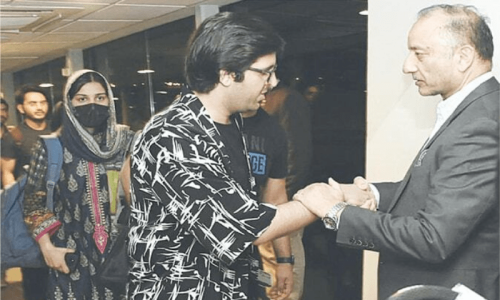RIYADH: Saudi Arabia gathered officials from 40 Muslim countries on Sunday in the first meeting of a counterterrorism alliance, a move Crown Prince Mohammed bin Salman declared a “clear signal” to extremism.
“In past years, terrorism has been functioning in all of our countries... with no coordination” among them, he said in his keynote speech. “This ends today, with this alliance.”
The crown prince vowed to “pursue terrorists until they are wiped from the face of the Earth”.
He said the 40 countries were sending a “clear signal” that they would “work together to support the military, financial, intelligence and political efforts of every member state”.
The summit was the first meeting of defence ministers and other senior officials from the Islamic Military Counter Terrorism Coalition (IMCTC), which officially counts 41 members.
Raheel says IMCTC will support partners through intelligence sharing and capacity building
The alliance was announced in 2015 under the auspices of Prince Mohammed, whose rapid ascent since his appointment as heir to the throne in June has shaken the political scene across the region.
The alliance excludes Saudi Arabia’s arch-rival, Iran, as well as Syria and Iraq, whose leaders have close ties to Tehran.
Sunday’s meeting coincides with an escalation in tensions between Riyadh and Tehran, particularly over wars in Syria and Yemen and the political structure of Lebanon.
Saudi Arabia accuses Iran of supporting armed groups across the Middle East, including Lebanon’s Hezbollah and Yemen’s Houthi rebels.
The meeting also comes as several military coalitions, with backers including both Iran and key Saudi ally the United States, close in on the militant Islamic State (IS) group in Iraq and Syria.
The alliance meeting in Riyadh brings together Muslim or Muslim-majority nations including Afghanistan, Uganda, Somalia, Mauritania, Lebanon, Libya, Yemen and Turkey.
Retired army chief Gen Raheel Sharif has been appointed commander-in-chief.
The alliance aimed to “mobilise and coordinate the use of resources, facilitate the exchange of information and help member countries build their own counterterrorism capacity”, said Gen Sharif on the occasion.
He emphasised that the IMCTC’s sole objective was counterterrorism and it was not against any country or any sect.
The commander said that while all individual states were making efforts against the menace of terrorism, the required level of synergy and resources were lacking.
He said that IMCTC would support its partners mainly through intelligence sharing and capacity building.
Gen Sharif said that Muslim world was the biggest sufferer of the menace of terrorism and during the last six years alone, more than 70 per cent of all deaths attributed to terrorism had occurred in Muslim countries.
“Fight against the faceless enemy with extremist ideology is complex and challenging, requiring collaboration. Pakistan has turned the tide and has had defeated the menace,” he said in his speech.
While the alliance officially includes Qatar, which is the target of a six-month boycott led by Saudi Arabia, organisers in Riyadh said no Qatari officials were present at the meeting. Qatar’s flag was also absent.
Saudi Arabia, the UAE, Egypt and Bahrain — all members of the counterterrorism alliance — abruptly cut diplomatic and trade ties with Qatar in June, accusing the emirate of being too close to Iran and supporting Islamist extremism.
Qatar denies the allegations.
Egypt, which sent a military official and not its defence minister to the meeting, is reeling from a Friday attack on a mosque that killed more than 300 people during prayer time.
While IS has not claimed responsibility, Egyptian authorities say the organisation is the main suspect as the mosque is associated with followers of the mystical Sufi branch of Islam, whom IS has branded heretics.
Prince Mohammed said Friday’s “painful event” was a reminder of the “danger of terrorism and extremism”.
“Beyond the killing of innocent people and the spread of hatred, terrorism and extremism distort the image of our religion,” he said.
Published in Dawn, November 27th, 2017














































Dear visitor, the comments section is undergoing an overhaul and will return soon.